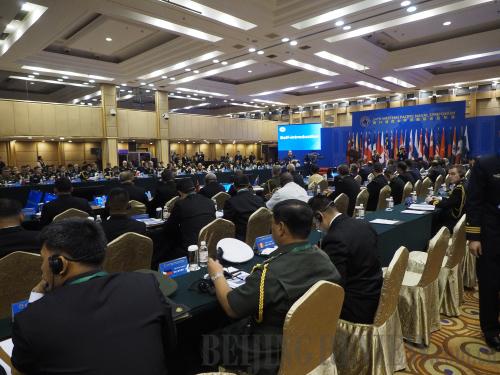|
 |
|
A SEA OF OPINIONS: Delegates from the 25 member and observer countries gather in Qingdao, east China's Shandong Province, for the 14th Annual Conference of WPNS (YIN PENGXUAN) |
Click here for more photos
A group of more than 140 delegates, consisting of naval chiefs and representatives from 25 member and observer countries, attended the 14th Annual Conference of the Western Pacific Naval Symposium (WPNS) in east China's coastal city of Qingdao on April 22 and 23. Centering on the theme of "cooperation, trust and win-win," delegates at the one-and-a-half-day meeting reviewed the work of WPNS-sponsored seminars and other activities over the past year and deliberated on maritime regulations, among other discussions and exchanges in the West Pacific region.
Established in 1988, WPNS aims to enhance collaboration and the ability to operate together among the navies of West Pacific rim nations, so as to push forward pragmatic cooperation and better safeguard regional maritime security. WPNS is the only naval forum that holds regular multilateral dialogues and conducts cooperative activities in the region.
In the face of ever-growing transnational asymmetric threats in the maritime domain such as piracy, terrorism, drugs and arms smuggling, as well as human trafficking, interoperability among navies has become increasingly important and a cooperative and collaborative maritime security approach is the only way forward.
After more than 20 years' development, the number of WPNS countries has increased to 21 from its original 12 and WPNS is also influencing countries lying outside the Pacific region. Over the years, WPNS has emerged as one of the most important maritime security cooperation mechanisms. It possesses the potential to curb maritime challenges and to resolve major issues through cooperation in the maritime domain.
It was the first time that China, one of WPNS' 12 founding members, had hosted the biennial symposium. As Admiral Wu Shengli, Commander in Chief of the People's Liberation Army (PLA) Navy, pointed out in his keynote speech, it's important to continue deepening cooperation under the framework of the WPNS.
According to Wu, it's crucial to overcome the "zero-sum" mindset and work to create a tolerant and friendly environment. It's also necessary to foster high-level strategic communication and increase maritime interaction, thereby strengthening mutual trust. The region should try to reach a win-win result where security and development goes hand in hand, with all sides jointly working for peace, obligations and the future. As the WPNS keeps growing and expanding, the cooperative action might well be referred to as the Pacific Naval Symposium.
These proposals and concepts are widely recognized by members and observer countries attending the WPNS annual conference.
"Through this symposium, we can achieve the expected goals of improving understanding and trust between various navies, and further deepening maritime pragmatic cooperation," said Admiral Wu.
"It makes all the difference in the world to get all of the nations in the West Pacific together, and to meet and decide on how we are going [to draft] a foundational document for behavior, for our cooperation, for unexpected encounters and to get together and vote to accept that. It's a big step forward," said Admiral Jonathan Greenert, U.S. Chief of Naval Operations, discussing the significance of the symposium.
As one of the founding members, China has itself been actively engaged in relevant activities at various levels, participating in the formulation and amending of relevant technical documents and regulations. The active participation of the PLA Navy will greatly help to push forward the development of WPNS and also the formation of a more extensive, fair and equal Asia-Pacific maritime security framework in addition to an effective cooperation mechanism, contributing to the establishment of a harmonious maritime relationship among countries. The 14th annual conference of WPNS is an important symbolic event in the Chinese navy's efforts to promote multilateral maritime security cooperation.
A big step forward
One significant achievement from this symposium was the creation of a new naval code of conduct, called CUES—the Code of Unplanned Encounters at Sea—which aims to avoid dangerous situations among navies in the Pacific Rim.
As is quoted from the first version of CUES, "WPNS navies that choose to adopt CUES for naval cooperation do so on a voluntary and non-binding basis," which implies that the CUES document is not legally binding, but instead is an agreement upon which the participating nations have a standardized protocol of safety procedures, basic communications and basic maneuvering instructions to follow for naval ships and aircraft in cases of unplanned encounters at sea.
For years, the International Regulations for Preventing Collisions (COLREG), which was signed in London in 1972, has been used as a code to prevent ships from colliding in international waters. China agreed to abide by this code in 1980. It defines how ships should "greet" each other on the high seas and in waters that are connected to the high seas and those which allow ships general access.
| 